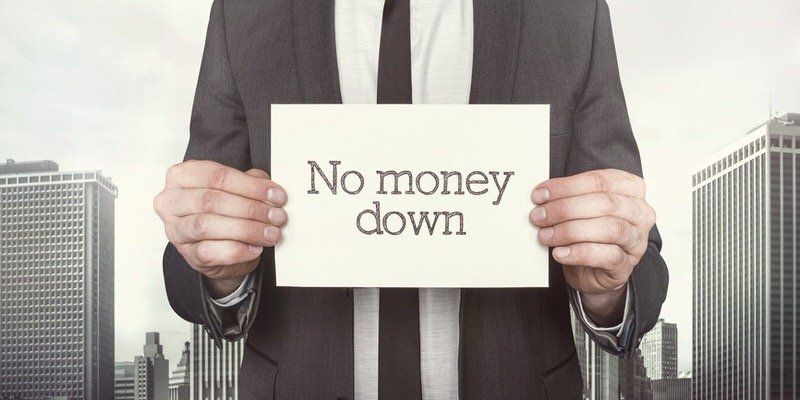Can I Give Someone The Downpayment to Buy My House?
Rita Wagner • March 3, 2020

Although it might not always be this straightforward, the question "Can I give someone the downpayment to buy my house?" presents itself in many different ways. And the answer to all of them is no, well... except in one circumstance, but we will get to that later. Here are a few scenarios played out.
"I am selling my house on ComFree and I have someone who is interested in purchasing my property, but they don't quite have the full downpayment, can I give them part of the downpayment to help them out? I REALLY need to sell my house! Does the bank really care where the downpayment comes from?"
Let's establish why the lender cares about where the downpayment comes from, there are 3 reasons.
Firstly by law, they have to. In order to prevent money laundering, lenders have to prove the source of the downpayment on the purchase of a home. Acceptable forms of downpayment are from own resources, borrowed (through an insured program called the FlexDown), or gifted from an immediate family member. To prove the funds are own resources, 90 days bank statements are required indicating the money has been in the account for 90 days or to show an accumulation of funds through payroll deposits.
Secondly, the lender cares about the source of the downpayment because it indicates the buyer is financially qualified to purchase the home. Obviously a downpayment from own resources is best, as it shows that the buyer has positive cash flow, is able to save money and manages their finances in a way that they will most likely make their mortgage payments on time. The bigger the downpayment the better (as far as the lender is concerned) because there is a direct correlation between how much money someone has as equity in a property to the likelihood they will/won't default on their mortgage. To break that down... the more skin you have in the game, the less likely you are to walk away.
Thirdly and most important to this scenario, the downpayment establishes the loan to value ratio. Now, the loan to value ratio or LTV is the percentage of the property's value compared to the mortgage amount. In Canada, a lender cannot lend more than 95% of a property's value, or said in another way they can't lend higher than a 95% LTV. This means that if someone is buying a home for $400k, the lender can lend $380k, and the buyer is responsible to come up with 5% or $20k in this situation.
So how does the source of the downpayment impact LTV?
Great question, and to answer this, we have to look at how a property's value is established. Although we could go into a lot more detail here, very simply put, something is worth what someone is willing to pay for it and what someone is willing to sell it for. Of course within reason, having no external factors coming into play and when you are dealing with real estate, it's usually compared to what people have agreed to in the past on similar properties. So combining our scenarios, if you are selling your house for $400k and you give the $20k downpayment to the buyer, the actual sale price (the amount you agreed to sell for, and the amount the buyer pays) is actually $380k not $400k. So to take the purchase contract in to the lender and request a mortgage for $380k would actually be a 100% LTV and financing will be declined because the minimum LTV in Canada is 95%.
Now, despite how people attempt to rationalize or manoeuvre wording and money, its all smoke and mirrors, if the buyer isn't coming up with the money for the downpayment independent of the seller, it impacts the LTV and financing will not be completed. Here are variations of this scenario played out in different ways.
"Can I increase the sale price of the property I'm selling and "gift" the downpayment to the buyer so they have a bigger downpayment and it looks more favourable to the lender?"
Nope, again, this is a trick to try and manipulate the LTV.
"If the buyer wants my house really badly, but doesn't have the full downpayment, can they borrow the money from somewhere and then we provide them with a cash back at closing to repay the debt?"
No. ANY cash back from the seller to the buyer when the purchase transaction closes is a no go. Just like on the front end of the purchase, any money refunded or given back on closing impacts the LTV and it would impact the mortgage lenders decision to lend.
"But what if the lender doesn't know about it?"
This is called fraud. Having conditions to the sale of a property that are not disclosed to the lender is fraud. There is no 2 ways about it.
"You mentioned at the start of this article that there is one way to give someone the downpayment to buy a house, tell me more!"
As mentioned, there are 3 acceptable sources for a downpayment, one of them being a gift from an immediate family member. So if you are selling your property to an immediate family member, you are able to gift the equity to them on the purchase contract. You would write that condition on the actual purchase contract, that the downpayment is coming by way of a gift. You would then complete a gift letter indicating that the downpayment is a true gift and has no schedule for repayment.
So there you have it. If you are selling a house to someone you are not directly related to, you are not able to give them the money for your downpayment. Alternatively, if you are buying a house from someone you are not directly related to, you are not able to take money from them for the downpayment. If anyone tells you otherwise, they are misinformed. And if anyone ever presents a way to "get around the rules" regardless of how simple it sounds, it's probably fraud.
If you have any questions about this or anything else mortgage related, I would love to talk with you!
Contact me anytime!
Share
RECENT POSTS

Thinking of Calling Your Bank for a Mortgage? Read This First. If you're buying a home or renewing your mortgage, your first instinct might be to call your bank. It's familiar. It's easy. But it might also cost you more than you realize—in money, flexibility, and long-term satisfaction. Before you sign anything, here are four things your bank won’t tell you—and four reasons why working with an independent mortgage professional is the smarter move. 1. Your Bank Offers Limited Mortgage Options Banks can only offer what they sell. So if your financial situation doesn’t fit neatly into their guidelines—or if you’re looking for competitive terms—you might be out of luck. Working with a mortgage broker? You get access to mortgage products from hundreds of lenders : major banks, credit unions, monoline lenders, alternative lenders, B lenders, and even private funds. That means more options, more flexibility, and a much better chance of finding a mortgage that fits you. 2. Bank Reps Are Salespeople—Not Mortgage Strategists Let’s be honest: most bank mortgage reps are trained to sell their employer’s products—not to analyze your financial goals or tailor a long-term mortgage plan. Their job is to generate revenue for the bank. Independent mortgage professionals are different. We’re not tied to one lender—we’re tied to you. Our job is to shop around, negotiate on your behalf, and recommend the mortgage that offers the best balance of rate, terms, and flexibility. And yes, we get paid by the lender—but only after we find you a mortgage that works for your situation. That creates a win-win-win: you get the best deal, we earn our fee, and the lender earns your business. 3. Banks Don’t Lead with Their Best Rate It’s true. Banks often reserve their best rates for those who ask for them—or threaten to walk. And guess what? Most people don’t. Over 50% of Canadians accept the first renewal offer they get by mail. No questions asked. That’s exactly what the banks count on. Mortgage professionals don’t play that game. We start by finding lenders offering competitive rates upfront, and we handle the negotiations for you. There’s no guesswork, no pressure, and no settling for less than you deserve. 4. Bank Mortgages Are Often More Restrictive Than You Think Not all mortgages are created equal. Some come with hidden traps—especially around penalties. Ever heard of a sky-high prepayment charge when someone breaks their mortgage early? That’s often due to something called an Interest Rate Differential (IRD) —and big banks are notorious for using the harshest IRD calculations. When we help you choose a mortgage, we don’t just focus on the interest rate. We look at the whole picture, including: Prepayment privileges Penalty calculations Portability Future flexibility That way, if your life changes, your mortgage won’t become a financial anchor. A Quick Recap What your bank typically offers: Only their own limited mortgage products Sales-focused representatives, not mortgage strategists Default rates that aren’t usually their best Restrictive contracts with high penalties What an independent mortgage professional delivers: Access to over 200 lenders and customized mortgage solutions Personalized advice and long-term financial strategy Competitive rates and terms upfront Transparent, flexible mortgage options designed around your needs Let’s Talk Before You Sign Your mortgage is likely the biggest financial commitment you’ll ever make. So why settle for a one-size-fits-all solution? If you're buying, refinancing, or renewing, I’d love to help you explore your options, explain the fine print, and find a mortgage that truly works for you. Let’s start with a conversation—no pressure, just good advice.

Mortgage Registration 101: What You Need to Know About Standard vs. Collateral Charges When you’re setting up a mortgage, it’s easy to focus on the rate and monthly payment—but what about how your mortgage is registered? Most borrowers don’t realize this, but there are two common ways your lender can register your mortgage: as a standard charge or a collateral charge . And that choice can affect your flexibility, future borrowing power, and even your ability to switch lenders. Let’s break down what each option means—without the legal jargon. What Is a Standard Charge Mortgage? Think of this as the “traditional” mortgage. With a standard charge, your lender registers exactly what you’ve borrowed on the property title. Nothing more. Nothing hidden. Just the principal amount of your mortgage. Here’s why that matters: When your mortgage term is up, you can usually switch to another lender easily —often without legal fees, as long as your terms stay the same. If you want to borrow more money down the line (for example, for renovations or debt consolidation), you’ll need to requalify and break your current mortgage , which can come with penalties and legal costs. It’s straightforward, transparent, and offers more freedom to shop around at renewal time. What Is a Collateral Charge Mortgage? This is a more flexible—but also more complex—type of mortgage registration. Instead of registering just the amount you borrow, a collateral charge mortgage registers for a higher amount , often up to 100%–125% of your home’s value . Why? To allow you to borrow additional funds in the future without redoing your mortgage. Here’s the upside: If your home’s value goes up or you need access to funds, a collateral charge mortgage may let you re-borrow more easily (if you qualify). It can bundle other credit products—like a line of credit or personal loan—into one master agreement. But there are trade-offs: You can’t switch lenders at renewal without hiring a lawyer and paying legal fees to discharge the mortgage. It may limit your ability to get a second mortgage with another lender because the original lender is registered for a higher amount than you actually owe. Which One Should You Choose? The answer depends on what matters more to you: flexibility in future borrowing , or freedom to shop around for better rates at renewal. Why Talk to a Mortgage Broker? This kind of decision shouldn’t be made by default—or by what a single lender offers. An independent mortgage professional can help you: Understand how your mortgage is registered (most people never ask!) Compare lenders that offer both options Make sure your mortgage aligns with your future goals—not just today’s needs We look at your full financial picture and explain the fine print so you can move forward with confidence—not surprises. Have questions? Let’s talk. Whether you’re renewing, refinancing, or buying for the first time, I’m here to help you make smart, informed choices about your mortgage. No pressure—just answers.

Bank of Canada maintains policy rate at 2¼%. FOR IMMEDIATE RELEASE Media Relations Ottawa, Ontario January 28, 2026 The Bank of Canada today held its target for the overnight rate at 2.25%, with the Bank Rate at 2.5% and the deposit rate at 2.20%. The outlook for the global and Canadian economies is little changed relative to the projection in the October Monetary Policy Report (MPR). However, the outlook is vulnerable to unpredictable US trade policies and geopolitical risks. Economic growth in the United States continues to outpace expectations and is projected to remain solid, driven by AI-related investment and consumer spending. Tariffs are pushing up US inflation, although their effect is expected to fade gradually later this year. In the euro area, growth has been supported by activity in service sectors and will get additional support from fiscal policy. China’s GDP growth is expected to slow gradually, as weakening domestic demand offsets strength in exports. Overall, the Bank expects global growth to average about 3% over the projection horizon. Global financial conditions have remained accommodative overall. Recent weakness in the US dollar has pushed the Canadian dollar above 72 cents, roughly where it had been since the October MPR. Oil prices have been fluctuating in response to geopolitical events and, going forward, are assumed to be slightly below the levels in the October report. US trade restrictions and uncertainty continue to disrupt growth in Canada. After a strong third quarter, GDP growth in the fourth quarter likely stalled. Exports continue to be buffeted by US tariffs, while domestic demand appears to be picking up. Employment has risen in recent months. Still, the unemployment rate remains elevated at 6.8% and relatively few businesses say they plan to hire more workers. Economic growth is projected to be modest in the near term as population growth slows and Canada adjusts to US protectionism. In the projection, consumer spending holds up and business investment strengthens gradually, with fiscal policy providing some support. The Bank projects growth of 1.1% in 2026 and 1.5% in 2027, broadly in line with the October projection. A key source of uncertainty is the upcoming review of the Canada-US-Mexico Agreement. CPI inflation picked up in December to 2.4%, boosted by base-year effects linked to last winter’s GST/HST holiday. Excluding the effect of changes in taxes, inflation has been slowing since September. The Bank’s preferred measures of core inflation have eased from 3% in October to around 2½% in December. Inflation was 2.1% in 2025 and the Bank expects inflation to stay close to the 2% target over the projection period, with trade-related cost pressures offset by excess supply. Monetary policy is focused on keeping inflation close to the 2% target while helping the economy through this period of structural adjustment. Governing Council judges the current policy rate remains appropriate, conditional on the economy evolving broadly in line with the outlook we published today. However, uncertainty is heightened and we are monitoring risks closely. If the outlook changes, we are prepared to respond. The Bank is committed to ensuring that Canadians continue to have confidence in price stability through this period of global upheaval. Information note The next scheduled date for announcing the overnight rate target is March 18, 2026. The Bank’s next MPR will be released on April 29, 2026. Read the January 28th, 2026 Monetary Report



